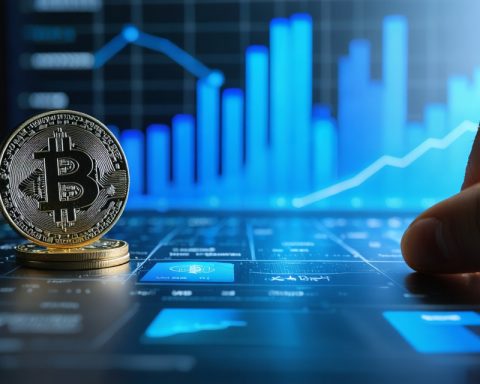- The Ripple vs. SEC court case could significantly influence the classification of cryptocurrencies as securities, affecting global blockchain regulation.
- A ruling favoring the SEC might result in stricter regulations for digital assets, potentially hindering innovation in the U.S. blockchain sector.
- If Ripple prevails, it could invigorate the cryptocurrency industry, promoting decentralized innovation and prompting countries to reassess their regulatory frameworks.
- The case highlights environmental considerations, with Ripple’s XRP showcasing less energy-intensive practices that could lead to more sustainable blockchain technologies.
- The outcome will have implications far beyond financials, impacting how new technologies align with global regulatory standards and the U.S.’s role in the digital currency landscape.
In a courtroom saga that could reshape the cryptocurrency landscape, Ripple Labs faces off against the U.S. Securities and Exchange Commission (SEC) over the fate of its XRP token. This high-stakes legal drama revolves around a critical question: Should XRP be classified as a security? The outcome will echo far beyond Ripple, potentially altering the future of blockchain innovation worldwide.
At the heart of the debate is not just legal classification but the broader implications for how cryptocurrencies are regulated. If the court rules in favor of the SEC, XRP, along with countless other digital assets, could fall under stringent U.S. regulations. This could deter blockchain startups from operating in the U.S., potentially stalling innovation in one of the world’s largest economies.
Ripple’s victory, on the other hand, might energize the cryptocurrency industry, encouraging a wave of innovation and reinforcing the principles of decentralization that the crypto community cherishes. Such a decision could prompt countries to re-evaluate regulatory frameworks, striving for a balance between encouraging technological advancements and protecting consumers.
Meanwhile, the environmental impact of cryptocurrencies is also thrust into the spotlight. Ripple’s XRP, using a less energy-intensive consensus mechanism, poses a crucial question about sustainability amidst regulatory scrutiny. A more favorable outcome for Ripple could inspire a shift towards eco-friendlier blockchain practices, promoting greener initiatives within the industry.
This case isn’t just about financial gains or losses; it’s a defining moment in how new technologies will mesh with global regulatory landscapes. As nations watch closely, the Ripple vs. SEC outcome could either bolster the U.S.’s standing in the digital currency race or push it further behind. Ultimately, it underscores the pivotal interplay between technological progress and regulatory support in shaping the digital future.
This Courtroom Battle Could Change the Crypto Landscape Forever!
Pros and Cons of the Ripple vs. SEC Case
The Ripple vs. SEC case isn’t just a legal battle; it’s a defining struggle that could change how cryptocurrencies are regulated in the U.S. and globally. Here are the strengths and weaknesses:
Pros
– Potential for Clarity: A ruling in favor of Ripple might offer clarity on how cryptocurrencies are classified, providing legal certainty for crypto companies.
– Innovation Boost: Should Ripple win, it could pave the way for more blockchain innovations by removing potential regulatory hurdles.
– Environmental Benefits: Ripple’s use of an energy-efficient consensus mechanism could set a standard for ecological sustainability in crypto.
Cons
– Strict Regulations: If the SEC wins, it might lead to stringent regulations that could stifle innovation and discourage crypto startups from establishing in the U.S.
– Market Instability: The outcome could lead to price volatility in XRP and other cryptocurrencies, potentially impacting investors.
Market Forecasts and Predictions
The outcome of Ripple vs. SEC is immensely important for crypto market dynamics:
– If Ripple Wins: Expect a surge in market confidence, potentially attracting new investors. This could lead to an increase in the adoption of not only XRP but also other alternative cryptocurrencies.
– If the SEC Wins: There’s a potential risk of market contraction with heightened regulatory scrutiny. Markets might react negatively, leading to short-term losses but could eventually stabilize as companies adapt to new regulations.
Environmental Sustainability and Blockchain
Ripple’s environmentally friendly XRP Ledger (XRPL) could become a template for sustainable blockchain practices:
– Energy Efficiency: Unlike Bitcoin’s proof-of-work system, XRPL uses a consensus protocol requiring significantly less energy, which could become crucial as environmental concerns around blockchain technologies increase.
– Green Initiatives: A favorable verdict for Ripple may encourage other crypto projects to adopt greener technologies, aligning with global sustainability goals.
What are the biggest implications of the Ripple vs. SEC case on the cryptocurrency industry?
The Ripple vs. SEC case has the potential to redefine the parameters under which cryptocurrencies operate. A decision favoring the SEC could lead to increased regulatory scrutiny, potentially stifling innovation and causing volatility in the cryptocurrency market. Conversely, a Ripple victory could bolster the legitimacy of digital assets, leading to an increase in market adoption and confidence.
How might the Ripple vs. SEC outcome influence the global regulatory landscape?
If Ripple wins, countries worldwide may consider revisiting and possibly relaxing their regulatory frameworks to encourage technological innovation and investment. This might position nations favorably in the global digital economy. However, an SEC victory could provoke countries to tighten regulations to protect consumers, possibly slowing down the pace of crypto adoption and innovation.
What role does environmental sustainability play in the Ripple vs. SEC case?
Ripple’s utilization of a less energy-intensive consensus mechanism brings the spotlight to environmental sustainability in blockchain. The case serves as a potential catalyst for the industry to prioritize eco-friendly practices, especially if Ripple’s approach receives favorable recognition. This could spark a trend towards more sustainable technological solutions within the crypto industry.
For more insights into what’s unfolding in the world of blockchain and cryptocurrencies, visit Coindesk. Explore the latest developments and in-depth analyses of this revolutionary technology.
















